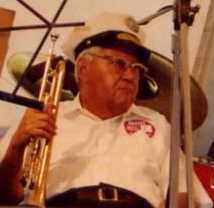Percy Humphrey

Percy Gaston Humphrey (January 13, 1905 – July 22, 1995) was a jazz trumpet player and bandleader in New Orleans, Louisiana.
In addition to his own jazz band, Percy Humphrey and His Crescent City Joymakers, for more than thirty years he was leader of the Eureka Brass Band. He also played in the band of the pianist Sweet Emma Barrett. From its opening in the early 1960s, until shortly before his death Humphrey played regularly at Preservation Hall, traveling internationally for performances with the Preservation Hall Jazz Band and his own bands.
Percy Humphrey was the son of clarinetist Willie Eli Humphrey, as well as being the younger brother of clarinetist Willie Humphrey and trombonist Earl Humphrey. His grandfather was the renowned "Professor" Jim Humphrey, who took the train from New Orleans to sugar cane plantations during the 1890s, in order to teach the basics of music to the children of plantation workers. Many of those he taught would play the jazz that was born in New Orleans near the turn of the twentieth century—including these members of the two following generations of his own family.
The Eureka Brass Band had been founded in 1920, by trumpeter Willie Wilson, and its early members included clarinetists Willie Parker, John Casimir, and George Lewis. In the 1930s Wilson became ill, during which time trumpeter Alcide Landry had nominal control over the band, but after 1937, Wilson's illness forced him to leave completely. At that time, trombonist Joseph "Red" Clark briefly became the leader, followed by Dominique "T-Boy" Remy, who led it from 1937 through 1946. Finally, Humphrey took over the band and led the group for the remainder of its existence.
The members of the band varied at any given time, usually having nine to eleven members. The typical instrumentation was three trumpets, two trombones, two reeds, tuba, snare drum, and bass drum. Reed instruments are many, including the saxophones that often are found among jazz bands, but the clarinet is characteristically the signature reed instrument of New Orleans jazz.
They recorded prolifically. Phonograph records and albums were cut for Pax, Alamac, Folkways, Jazzology, and Sounds of New Orleans. A 1951 album, New Orleans Parade, features Humphrey, trombonists Charles "Sunny" Henry and Albert Warner, and saxophonist Emanuel Paul. Their 1962 sessions, Jazz at Preservation Hall, Volume 1: the Eureka Brass Band of New Orleans, issued on Atlantic Records, features Humphrey and his brother, clarinetist Willie Humphrey, trumpeters Kid Sheik Cola and Pete Bocage, trombonists Albert Warner and Oscar "Chicken" Henry, Emanuel Paul on tenor saxophone, Wilbert "Bird" Tillman on sousaphone, snare drummer Josiah "Cie" Frazier, and bass drummer Robert "Son Fewclothes" Lewis.
After 1975, the Eureka Brass Band disbanded, but Humphrey revived the name occasionally for festival performances and other appearances. He continued to lead his own band and played with others at Preservation Hall until his death in New Orleans in 1995. His last gig was at the annual New Orleans jazz festival in April, three months before his death at the age of ninety.
Discography
- New Orleans: The Living Legends (Riverside Records)
References
External links
|